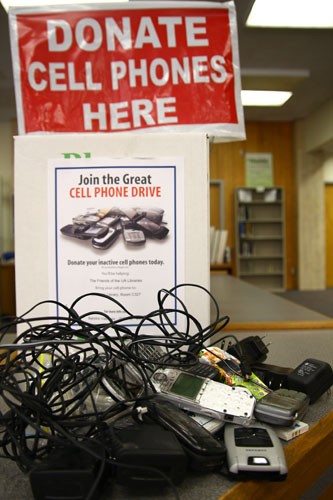Electronic waste is a problem that often goes unacknowledged by both communities and the government, according to UA alumna and U.S. trial attorney Maya Abela and anthropology graduate student Jacob Campbell’s recent research.
“”One of the things we certainly want to avoid is continuing to have systems in place that allow for there to be unregulated transfers of electronic waste around the globe based entirely on market inequality,”” Campbell said.
Several common electronics used by U.S. consumers get sent to poor countries with lax standards after they’re thrown away, and not only do the effects harm the environment, but the toxic materials can harm workers as well, according to Campbell.
“”It takes a lot of work to break down a cell phone, TV or computer and get out the copper wire, get out the elements of the circuit board that are useful and can be recycled. Unless it’s done properly, it’s toxic and not good for you,”” Campbell said.
He said materials are often shipped to China, other East Asian countries and Nigeria, where they are dismantled and picked apart for anything valuable. In several instances, many parts get burned and there is little supervision.
Abela and Campbell’s paper, “”E-Wasted Time: The Hazardous Lag in Comprehensive Regulation of the Electronics Recycling Industry in the United States,”” available on the UA’s Udall Center for Studies in Public Policy website, calls for a different approach to electronic waste, changing the idea that we can just get rid of something once we’re done with it.
“”That mentality is going to eventually backfire on us when the sheer numbers and volumes of stuff gets to the point where the landfills can’t handle it. Recycling isn’t sophisticated enough to bring the usable materials back into the stream of new goods, too ignorant to make sacrifices,”” Campbell said.
Another aspect of the problem is poisoning people with hazardous elements from electronic waste.
“”There’s lead, arsenic, mercury — all kinds of stuff we don’t want in our ground water or (that) of our neighbors in Mexico,”” Campbell said.
Although awareness seems low, this past month the UofA Bookstore teamed up with University Information Technology Services to hold the Cyberjunk Collection. This event offered to take old computers, monitors, cell phones and other electronics from the community for recycling.
Daniel McConnell, the computer service center manager at the bookstore, said they partnered up with Apple, taking the materials to ECS Refining of Santa Clara, Calif., which pays for the shipping and recycling.
“”Nothing goes overseas, everything stays here. They recycle it to the bare component and strip it, so hazardous stuff doesn’t go into the landfills,”” McConnell said.
According to McConnell, who helped coordinate the drive, this was the event’s third year.
“”It’s just gradually gotten bigger and bigger. We got kind of amazing numbers this year,”” McConnell said.
While numbers have increased, some students were still oblivious to the event, but said they would bring their used electronics if they knew of the opportunity.
When asked if he would have participated, systems engineering junior Louie Benitez said he would not hesitate.
“”Of course. I have like two old iPods that are just sitting in my closet,”” Benitez said.
Environmental sciences sophomore Lacy Padilla feels students do not take the time to safely dispose of their electronics, and thinks that there should be a drop box available on campus.
“”We’re students. All of us have Macs, cell phones, iPods and they break. What do you do with it? Typically, people throw it in the trash, and that’s not okay. That’s detrimental to the environment,”” Padilla said.
She added that for the next Cyberjunk Collection, she would absolutely bring her electronics.
“”My Mac’s not dying yet, but its shelf life is pretty close. If that dies, it would be so much easier to take it here on campus, where you’re here every day. People aren’t lazy, but we’re busy,”” Padilla said.
Higher numbers of convenient drop-off places for recycling electronics would help eliminate the problem, as well as more government involvement.
“”For the most part, there’s nothing legally binding for a company or consumer to institute a particular kind of recycling scheme. Right now it’s almost entirely a voluntary-based thing, with very little regulation. We kind of advocated for a clear and decisive scheme at the federal level that creates a standard that we should follow with penalties,”” said Campbell of his and Abela’s research.
He believes it would be more logical for the similar amount of energy that goes into purchasing the latest or trendiest gadgets to go into making it crystal clear what to do with the old ones.
“”It’s a disincentive at this point. A lot of places you have to pay to recycle stuff, and it’s a pain in the neck to do this stuff. For us to look further into the future, we can’t afford to continue doing that because we’ll be up to our neck in this stuff,”” Campbell said.
Both Padilla and Benitez agree that legislation would be beneficial.
“”I think it would be good. They should probably act towards it, so they can kind of force us to do good things,”” Benitez said.
Padilla believes a law would bring awareness as well as help solve the problem. With the government’s assistance and recognition of the problem, Padilla thinks the public would realize the potential damage of electronic waste.
“”They should definitely get involved. I know they don’t have a lot of funding right now, but they should really consider putting money towards that, because no one knows how bad it is,”” Padilla said.
While Campbell and Abela’s research found several negative aspects of this issue, Campbell also pointed out that not all transferring of electronics across borders is bad.
“”One person lives in Nogales, Sonora, and comes to Tucson, buys old computers people don’t want, cleans them up, loads them with Spanish language software and sells them for reasonable prices,”” Campbell said.
He emphasized that there are opportunities to responsibly reuse electronic resources and that not all electronic trash is merely dumped onto other countries.
“”There are some really good things happening. It’s just a matter of scaling them up and replicating them. It was sort of uplifting to do this work and get a sense that we are not without models,”” Campbell said.
The main goal is to pressure the government and producers of these materials to do the right thing, building up the systems to do a better job, according to Campbell.









